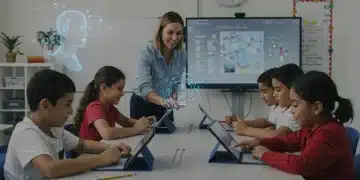Teacher AI tools 2025 trends to watch closely

Future skills for teachers in an AI-driven world include digital literacy, emotional intelligence, collaboration, and continuous professional development to effectively engage students and leverage technology in the classroom.
Teacher AI tools 2025 trends promise to reshape how we approach education. With technology advancing rapidly, how can educators adapt and thrive? Let’s dive into the exciting possibilities ahead.
Emerging AI tools for educators
As we explore the world of emerging AI tools for educators, it’s clear that technology is reshaping teaching methods. These tools are designed to enhance the learning experience, making lessons more engaging and effective.
What Are Emerging AI Tools?
Emerging AI tools can be defined as innovative technologies that leverage artificial intelligence to assist educators in various capacities. For example, tools like intelligent tutoring systems provide personalized learning experiences for students. Moreover, machine learning algorithms can analyze student performance and suggest tailored resources to improve their understanding.
Benefits of AI Tools in Education
The integration of AI tools in education offers numerous benefits. Consider these points:
- Personalization: AI can tailor learning experiences to meet individual student needs.
- Efficiency: Administrative tasks can be automated, allowing teachers to focus more on teaching.
- Engagement: Interactive AI tools can make learning fun and captivating for students.
With AI tools, teachers can analyze data quickly and adjust their teaching strategies accordingly. This real-time feedback helps identify student strengths and weaknesses, allowing for more effective lesson planning. Furthermore, AI-driven applications can provide immersive learning experiences through virtual reality or gamified lessons, making subjects more accessible.
As these technologies advance, teachers will have even more resources at their disposal to cater to diverse learning styles and needs. AI can pave the way for collaborative learning environments where students interact with their peers through digital platforms. These platforms not only enhance communication but also foster a sense of community among students.
Challenges of Implementing AI Tools
While the benefits are promising, there are challenges to consider. Educators need proper training to effectively use these new tools. Additionally, issues around data privacy must be addressed to protect student information. It’s essential that as we embrace AI technologies, we also focus on ethical considerations and equitable access for all schools.
In summary, emerging AI tools for educators present exciting opportunities for enriching the educational landscape. By leveraging these advancements, teachers can create more effective and engaging learning experiences for their students.
How AI enhances personalized learning

Artificial Intelligence (AI) is transforming education by enhancing personalized learning. This approach allows students to learn at their own pace and style, making education more effective. With tools powered by AI, educators can tailor lessons to meet the unique needs of each student.
The Role of AI in Personalized Learning
AI technologies analyze student data to create customized learning experiences. For instance, adaptive learning platforms use algorithms to adjust content based on a student’s performance. This means that if a student struggles with a topic, the AI can provide additional resources and exercises.
Benefits of Personalized Learning
The advantages of using AI for personalized learning are numerous:
- Individualized Feedback: Students receive instant, tailored feedback that helps them improve.
- Motivation: Personalized content keeps students engaged and motivated to learn.
- Flexibility: Students can learn anytime and anywhere, accommodating different schedules.
Moreover, AI can help identify learning gaps early on. This proactive approach allows teachers to intervene before these gaps widen. Instead of waiting for test scores, AI offers insights based on real-time data. Educators can then focus on teaching strategies that are most effective for each student.
Some AI tools even incorporate gamification, which turns learning into an engaging experience. By blending education with gaming elements, students are more likely to participate actively in their learning journey. This not only enhances understanding but also fosters a love for learning.
Challenges of Implementing AI in Education
Despite the promising benefits, integrating AI in classrooms isn’t without its challenges. Teachers must receive adequate training to utilize these tools effectively. Additionally, there are concerns regarding data privacy and ethics, which must be carefully managed. It’s essential that schools create clear policies to protect student information.
As we harness the power of AI, the goal should always be to enhance the learning experience for every student. Using technology wisely can lead to remarkable advancements in how education is delivered, ensuring that learning is both effective and accessible.
Trends in classroom AI adoption
Classroom AI adoption is on the rise, as educators realize the potential of technology to enhance teaching. This trend is shaping today’s educational landscape, bringing innovative tools into the hands of teachers and students alike.
Current Trends in AI Adoption
One significant trend is the increasing use of AI tutors that provide personalized support. These tools assist students outside of traditional classroom hours, offering help on challenging subjects. Additionally, schools are exploring AI-driven analytics to monitor student progress effectively.
The Role of data in AI Integration
Data plays a crucial role in how AI is integrated into classrooms. Schools collect student performance data to inform AI systems, which tailor educational content accordingly. This data-driven approach allows for:
- Real-time Insights: Teachers receive immediate feedback on student performance.
- Enhanced Lesson Planning: AI can suggest resources based on individual student needs.
- Greater Engagement: Interactive AI platforms keep students motivated to learn.
Furthermore, many classrooms are adopting virtual reality (VR) integrated with AI technology. This immersive experience allows students to explore complex concepts in engaging ways. For instance, a science class might take virtual field trips to distant planets or dive into the ocean to study marine life. These experiences can reinforce learning and stimulate interest in subjects.
Another trend is the collaboration between educational institutions and technology companies. As schools partner with tech firms, they gain access to cutting-edge resources that enhance classroom learning. This partnership is crucial for staying ahead in educational technology and meeting the evolving needs of students.
Challenges in AI Adoption
Despite these advancements, challenges remain in the adoption of AI in classrooms. Some educators express concerns about the effectiveness of AI solutions and their ability to address diverse learning needs. Additionally, training teachers to utilize these technologies effectively is vital for successful integration.
As AI continues to evolve, its use in education promises new possibilities. By staying informed and engaging with current trends, schools can create innovative learning environments for their students.
Future skills for teachers in an AI-driven world

In an AI-driven world, teachers face new demands. They must adapt to changing technologies and enhance their skills to provide quality education. Understanding these future skills is crucial for success in the classroom.
Essential Skills for Educators
The advent of technology means teachers need to develop a different set of skills. One essential skill is digital literacy. This includes navigating various educational technologies, learning management systems, and AI tools that support personalized learning. Educators must also understand data analytics to assess student performance effectively and tailor instruction accordingly.
Collaboration and Communication
Collaboration with peers and communication with students is more important than ever. Educators should be proficient in using tools that facilitate online collaboration. Mastering these tools enables teachers to create engaging and interactive environments.
- Networking: Connecting with other educators through social media platforms can help share best practices.
- Engagement: Knowing how to engage students in discussions enhances their learning experience.
- Feedback: Providing constructive feedback using digital platforms can improve student outcomes.
Another essential skill is adapting to emerging technologies. As AI tools develop, teachers must stay informed about the latest advancements. Understanding how to leverage these technologies can enhance teaching methods and foster innovation in the classroom.
Furthermore, it is important for educators to be lifelong learners. They should engage in professional development opportunities to keep their skills sharp. Workshops, webinars, and online courses can help teachers stay current with trends and enhance their teaching practices.
Empathy and Emotional Intelligence
Despite advancements in technology, the human side of teaching remains vital. Educators need to cultivate empathy and emotional intelligence to support their students effectively. Understanding students’ emotional well-being is essential for creating a positive learning environment. Teachers who can connect with their students on a personal level foster trust, leading to better academic performance.
In conclusion, as we move into an AI-driven future, teachers must develop a diverse skill set that includes technical expertise, emotional intelligence, and a commitment to lifelong learning. This combination will enable educators to thrive in the evolving educational landscape.
As we look towards the future, educators must embrace new skills to thrive in an AI-driven world. This involves not only adapting to emerging technologies but also fostering empathy and emotional intelligence. By blending technical expertise with human connection, teachers can create engaging learning environments. Lifelong learning will empower educators to stay updated with trends and best practices. It’s about being prepared to guide students in a rapidly changing landscape, ensuring their success in the digital age.
FAQ – Questions About Future Skills for Teachers in an AI-Driven World
What are the essential skills teachers need in an AI-driven world?
Teachers need skills in digital literacy, data analysis, collaboration, and emotional intelligence to navigate an AI-enhanced classroom.
How can teachers stay updated with emerging technologies?
Teachers can engage in professional development through workshops, online courses, and tech integration training to stay current with educational tools.
Why is empathy important for teachers in the age of AI?
Empathy helps teachers connect with students on a personal level, fostering a positive learning environment that supports emotional well-being.
What role does lifelong learning play for educators?
Lifelong learning enables teachers to continuously improve their skills and adapt to new teaching methods, ensuring they provide the best education possible.





